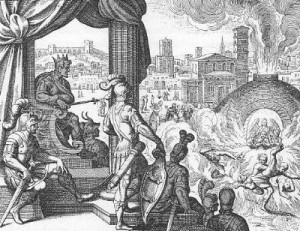I learned something interesting from Rabbi Azarya Berzon of the Toronto YU Kollel this week.
The midrashic story of Avram’s brother Haran is well-known. It is based on the term ‘Ur Kasdim’, (‘Ur of the Chaldeans’) in Genesis 11:28. In Rashi’s version:
“The Midrash teaches us that he died on account of his father. For Terach complained to Nimrod that Avram had crushed his idols, so Nimrod cast Avram into a fiery furnace. Haran sat and thought, ‘If Avram is victorious, I am on his side, and if Nimrod is victorious, I am on his side.’ When Avram was saved, they said to Haran, ‘Whose side are you on?’ Haran said to them, ‘I am on Avram’s side!’ They cast him into the fiery furnace and he was burned.”
However there (at least) are two other versions.
In one, when Avram emerges from the furnace and Haran declares his allegiance, the onlookers assume that Haran is some kind of magician who was able to keep the fire from harming Avram. To set the record straight, God has the fire leap from the furnace and consume Haran! In this version, Haran’s doubts seem superfluous to the story. Also, while he harbored heretical thoughts, he still declared his allegiance to Avram, so for God to kill him to make an apparently unrelated theological point seems rather harsh! Perhaps one could say that just as Haran was killed despite his apparent innocence, any victim may be harboring secrets that are not apparent to the onlooker, so one cannot fairly judge God’s justice. The theological ramifications are still quite difficult though.
In a third version, Haran is cast into the furnace and the fire consumes his insides but leaves his body intact, such that he is able to stagger out of the furnace, only to die in his father’s arms. Rabbi Berzon explained that the midrash is commenting that as he was guilty of internal doubts (but outwardly declared his allegiance to Avram and God), the fire burned his insides but not the outward appearance of his body.
Nice touch!
Incidentally, while the whole story is clearly a rabbinic takeoff on the name ‘Ur’, it seems that the rabbis were unaware of (or ignored) the existence of the ancient city of Ur, and figured that ‘Kasdim’ was the name of the place. It is of course quite clear that ‘Ur Kasdim’ simply means ‘Ur of the Chaldeans’. Or am I missing something here?
